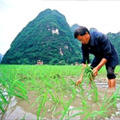![]() Nickerie.Net,
vrijdag 18 april 2008
Nickerie.Net,
vrijdag 18 april 2008
Hoge rijstprijs leidt tot paniek op beurzen
LONDEN/HONGKONG - De hoge prijs van rijst en een sterke vraag hebben deze week geleid tot paniek onder inkopers op grondstofbeurzen. De Filipijnen, de grootste rijstimporteur ter wereld, kon donderdag voor de vierde achtereenvolgende keer niet de hoeveelheid rijst kopen die het land voor ogen had.
 Bangladesh
kon deze week helemaal geen rijst kopen voor de geboden prijs. Dat berichtte de
Britse zakenkrant Financial Times vrijdag. Verscheidene landen die rijst
exporteren, zoals Vietnam, India, China en Cambodja, hebben onlangs de uitvoer
van rijst beperkt als gevolg van dreigende tekorten.
Bangladesh
kon deze week helemaal geen rijst kopen voor de geboden prijs. Dat berichtte de
Britse zakenkrant Financial Times vrijdag. Verscheidene landen die rijst
exporteren, zoals Vietnam, India, China en Cambodja, hebben onlangs de uitvoer
van rijst beperkt als gevolg van dreigende tekorten.
Voorraden
De prijs wordt extra opgedreven doordat veel landen veel grotere voorraden proberen aan te leggen dan zij normaal gesproken zouden doen. "Het is pure paniek'', citeert Financial Times een rijstexporteur uit Thailand.
Rijst is het belangrijkste voedingsmiddel voor miljarden mensen in Azië en Afrika. Regeringen zijn bang dat er onrust ontstaat als de prijzen door tekorten stijgen. Zij proberen daarom grote voorraden aan te leggen en de prijzen kunstmatig laag te houden voor de bevolking.
Oorspronkelijk bericht:
Rice traders hit by panic as prices surge
Fianacial Times - By Javier Blas in London and Raphael Minder in Hong Kong, April 17 2008
Rice prices hit the $1,000-a-tonne level for the first time on Thursday as panicking importers scrambled to secure supplies, exacerbating the tightness already provoked by export restrictions in Vietnam, India, Egypt, China and Cambodia.
The jump came as the Philippines, the largest rice importer, failed for the fourth time to secure as much rice as it wanted. The unsuccessful tender followed Bangladesh’s inability to buy any rice at all this week. Traders and analysts warned that rice demand was escalating in spite of prices rising to three times the level of a year ago as countries try to build up stocks.
Vichai Sriprasert, president of Riceland International, a leading rice exporter in Bangkok, said several of its customers, including governments, were buying far more than they usually did amid fears about scarcity.
“It is panic,” he said. “My customers are demanding double the usual volume. We would not have enough supplies for all the demand we are facing.”
Michael Whitehead, a rice specialist at Rabobank in New York, added: “The potentially destabilising social effect of rice shortages in most high-consumption countries has strengthened the resolve of governments to build supply.”
Rising rice prices have triggered riots in the past month in countries such as Haiti, Bangladesh and Ivory Coast. Rice is considered the most political agricultural commodity as it is a staple for about 3bn people in poor countries in Asia and Africa.
Ajith Nivard Cabraal, Sri Lanka’s central bank governor, told the Financial Times that the rise in food prices was “definitely” a bigger problem for Asia than the ongoing credit crunch.
“Food is something which without we cannot live,” he said. “Social consequences could be very adverse.”
In an effort to maintain social peace through low local prices, governments have stepped up their purchases.
Manila’s rice tender on Thursday received offers for only 325,000 tonnes, a third below the government’s target. It faced record prices, with the average offer at $1,046 a tonne, up 47 per cent from March. Some of the offers hit $1,220 a tonne.
That strength boosted indicative quotes for Thai medium-quality rice, the global benchmark, to a range of $950-$1,000 a tonne, traders said. In Chicago, US rice futures hit an all-time high of $23.3 per 100 pounds.
But Anthony Lam, of Golden Resources, the largest rice wholesaler in Hong Kong, said prices were near their peak. “There is now no big natural disaster to raise it further.”
|
Bron/Copyright: |
|
|
Nickerie.Net / ANP / Financial Times |
18/04/2008 |
|
|
E-mail: info@nickerie.net
Copyright © 2008. All rights reserved.
Designed by Galactica's Graphics